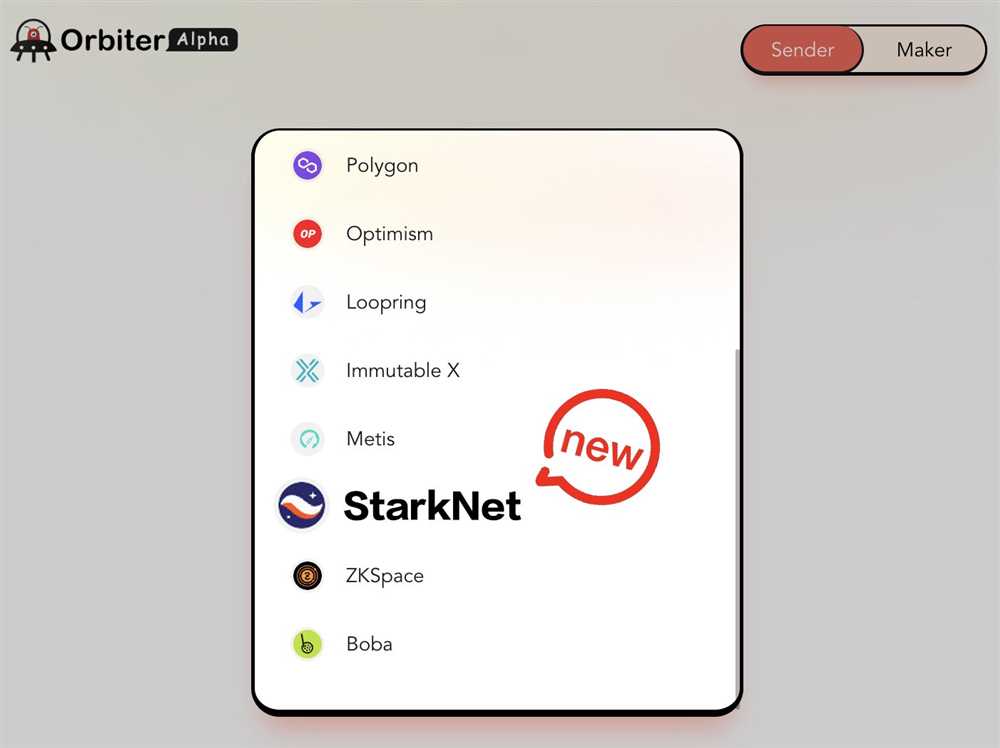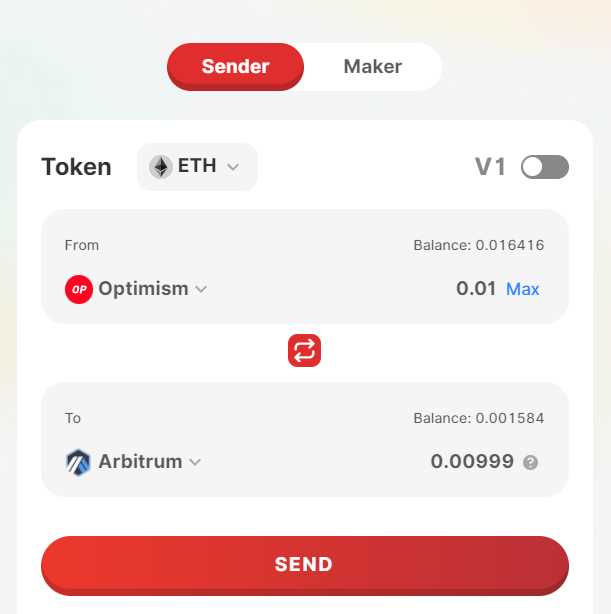
How Multichain is Revolutionizing the DeFi Space An Analysis inspired by Orbiter Finance

In the booming world of decentralized finance (DeFi), innovation is key to staying ahead of the curve. As blockchain technology continues to evolve, new solutions are emerging to address the challenges and limitations of existing platforms. One such solution that is revolutionizing the DeFi space is Multichain.
Multichain is a cutting-edge technology that allows for the seamless interoperability of different blockchain networks. It enables developers to build applications that can harness the power of multiple chains, unlocking a world of possibilities for DeFi projects. This technology is changing the game by providing a scalable and efficient infrastructure for decentralized applications.
One of the projects leading the way in utilizing the full potential of Multichain is Orbiter Finance. Inspired by the vision of creating a decentralized economy that empowers individuals, Orbiter Finance leverages the interoperability of Multichain to offer a wide range of innovative financial products and services. From lending and borrowing to yield farming and decentralized exchanges, Orbiter Finance is redefining what is possible in the DeFi space.
With Multichain, Orbiter Finance is able to overcome the limitations of single-chain platforms, such as high transaction fees and network congestion. By leveraging multiple chains, Orbiter Finance is able to achieve higher scalability, faster transaction speeds, and lower costs, making it accessible to a wider range of users. This not only improves the user experience but also opens up new opportunities for developers and entrepreneurs to build and innovate.
In conclusion, Multichain is revolutionizing the DeFi space by enabling seamless interoperability between different blockchain networks. Projects like Orbiter Finance are pushing the boundaries of what is possible in decentralized finance by harnessing the power of Multichain. As the DeFi ecosystem continues to grow and evolve, technologies like Multichain will play a crucial role in shaping the future of finance.
Understanding the Impact of Multichain in the DeFi Space

Decentralized Finance (DeFi) has emerged as one of the most exciting and fast-growing sectors in the blockchain industry. It aims to revolutionize traditional financial systems by offering open, transparent, and inclusive financial services to anyone with an internet connection. However, as the popularity of DeFi continues to grow, scalability and interoperability have become critical issues that need to be addressed in order to unlock the true potential of this revolutionary technology.
This is where Multichain comes into play. Multichain is a technology that allows for the creation and operation of multiple parallel blockchains, each with its own unique features and capabilities. By utilizing Multichain, DeFi platforms are able to overcome the scalability limitations of traditional blockchains, such as high transaction fees and slow transaction speeds.
One of the key benefits of Multichain in the DeFi space is its ability to facilitate cross-chain communication and interoperability. This means that assets and data can be freely transferred between different blockchains, allowing for seamless interaction between various DeFi protocols. With Multichain, users can access a wide range of DeFi services and platforms, regardless of the blockchain they are built on.
In addition to scalability and interoperability, Multichain also offers enhanced security and privacy features. By allowing for the creation of private blockchains, Multichain ensures that sensitive financial information remains secure and confidential. This is especially important in the DeFi space, where privacy and data protection are major concerns for users.
Furthermore, Multichain enables the creation of customizable DeFi solutions that are tailored to specific use cases and requirements. Developers can leverage the flexibility of Multichain to design and deploy DeFi applications that meet the unique needs of different industries and user groups. Whether it’s lending and borrowing, decentralized exchanges, or liquidity pools, Multichain provides the tools and infrastructure to build scalable and efficient DeFi solutions.
Overall, Multichain is revolutionizing the DeFi space by addressing the scalability and interoperability challenges that have hindered its mainstream adoption. With its ability to support multiple blockchains and facilitate cross-chain communication, Multichain is unlocking new possibilities in the world of decentralized finance. As the DeFi ecosystem continues to evolve, Multichain will play a crucial role in shaping the future of finance.
How Multichain is Disrupting Traditional Finance with Orbiter Finance

Traditional finance has long been dominated by centralized institutions and intermediaries, creating inefficiencies, high fees, and limited accessibility for individuals around the world. However, with the emergence of blockchain technology and decentralized finance (DeFi), the financial landscape is undergoing a transformative shift.
One of the key technologies driving this transformation is Multichain, a blockchain platform that enables the creation and management of multiple interconnected chains. With Multichain, developers can build decentralized applications (dApps) that are secure, scalable, and interoperable across different chains.
The Rise of Orbiter Finance

Orbiter Finance, a leading DeFi platform, is leveraging the power of Multichain to disrupt traditional finance. By building on top of Multichain, Orbiter Finance is able to offer a range of innovative financial products and services, including lending, borrowing, and yield farming.
One of the advantages of using Multichain for Orbiter Finance is its ability to handle high transaction volumes and ensure fast and low-cost transactions. This infrastructure makes it possible for Orbiter Finance to provide efficient and cost-effective financial services to users, regardless of their location or the size of their transactions.
The Benefits of Multichain for Orbiter Finance

By utilizing Multichain, Orbiter Finance is able to overcome many of the limitations of traditional finance. Some of the key benefits include:
| Benefit | Description |
|---|---|
| Decentralization | By operating on a decentralized network, Orbiter Finance eliminates the need for intermediaries and allows users to have full control over their funds. |
| Security | Multichain’s robust consensus mechanism and cryptographic techniques ensure the security of user assets and transactions. |
| Interoperability | Through Multichain’s interoperability features, Orbiter Finance can seamlessly integrate with other blockchain networks and protocols, expanding its reach and functionality. |
| Accessibility | With Multichain, Orbiter Finance can offer its services to individuals from anywhere in the world, without the need for traditional banking infrastructure. |
The combination of Multichain’s technological capabilities and Orbiter Finance’s innovative approach is revolutionizing the financial industry. As more individuals recognize the advantages of decentralized finance, the traditional financial system will continue to be disrupted, paving the way for a more inclusive and efficient global economy.
Exploring the Benefits of Multichain Technology in DeFi

Multichain technology has emerged as a game-changer in the world of decentralized finance (DeFi). With its ability to connect multiple blockchain networks, multichain technology offers numerous benefits that are revolutionizing the DeFi space.
Interoperability: One of the key advantages of multichain technology is the ability to achieve interoperability between different blockchain networks. This allows for seamless transfer of assets and data between chains, enabling users to access a wide range of decentralized applications and services from different blockchain ecosystems.
Scalability: Multichain technology also addresses the scalability challenges faced by many blockchain networks. By allowing parallel processing on multiple chains, multichain technology significantly improves the scalability of DeFi applications, enabling them to handle a larger number of transactions without congestion or delays.
Flexibility: Multichain technology provides developers and users with flexibility in creating and customizing their own blockchain networks. This gives them the freedom to define their own rules, parameters, and governance mechanisms, allowing for the creation of tailored DeFi solutions that meet specific requirements.
Security: The use of multiple blockchain networks in a multichain ecosystem enhances the overall security of DeFi applications. By spreading the risk across multiple chains, it becomes more difficult for malicious actors to compromise the system. Additionally, the immutability and transparency of blockchain technology provide a high level of security and trust in DeFi transactions.
Cost-effectiveness: Multichain technology offers cost advantages for users and developers. By allowing for efficient resource allocation and sharing of infrastructure, multichain technology reduces transaction fees and operational costs, making DeFi more accessible and affordable for a wider range of users.
Innovation and Collaboration: Multichain technology opens up new possibilities for innovation and collaboration in the DeFi space. It allows developers and projects to leverage the strengths of different blockchain networks, enabling the creation of groundbreaking applications and fostering a collaborative ecosystem of DeFi participants.
Overall, the benefits of multichain technology in DeFi are vast and game-changing. With its ability to achieve interoperability, scalability, flexibility, security, cost-effectiveness, and foster innovation and collaboration, multichain technology is paving the way for the next generation of decentralized finance.
The Potential of Multichain in Facilitating Financial Inclusion

Financial inclusion is a global challenge that affects billions of people around the world. Many individuals and communities lack access to basic financial services, such as banking, lending, and insurance. This lack of access prevents them from participating fully in the economy and reaching their full potential.
Multichain technology has the potential to revolutionize financial inclusion by providing a decentralized and inclusive platform for financial services. By leveraging blockchain technology, multichain enables secure, transparent, and efficient transactions, removing the need for intermediaries and reducing costs.
One of the key advantages of multichain in facilitating financial inclusion is its ability to reach the unbanked and underbanked populations. Traditional banking systems often require a physical presence and extensive documentation, making it difficult for individuals in remote areas or without proper identification to access financial services. Multichain platforms can overcome these barriers by allowing individuals to create digital identities and access financial services through their mobile devices.
Moreover, multichain platforms can offer a wide range of financial services, including microfinance, lending, savings, and insurance, tailored to the specific needs of marginalized communities. These platforms can provide access to credit and capital for small businesses, enabling entrepreneurship and economic growth in underserved areas.
Furthermore, the transparent and immutable nature of blockchain technology ensures the security and integrity of financial transactions, reducing the risk of fraud and corruption. This increased trust and accountability can attract more individuals and businesses to participate in the financial system, fostering economic development and social progress.
In conclusion, multichain technology has the potential to greatly contribute to financial inclusion by providing a decentralized and inclusive platform for financial services. Through its ability to reach the unbanked and underbanked populations, offer tailored financial services, and ensure the security and integrity of transactions, multichain can empower individuals and communities to fully participate in the economy and improve their livelihoods.
Q&A:
What is Multichain?
Multichain is a blockchain platform that enables the creation and deployment of customized and scalable blockchain solutions. It provides a framework for building decentralized applications and smart contracts.
How does Multichain revolutionize the DeFi space?
Multichain revolutionizes the DeFi space by offering several key features. Firstly, it provides a scalable solution that can handle high transaction volumes, ensuring the efficiency of decentralized financial applications. Secondly, it enables the interoperability between different blockchains, allowing for the seamless transfer of assets and information. Finally, Multichain offers customizable smart contract functionality, empowering developers to create sophisticated financial instruments.
Can you provide an example of a project that utilizes Multichain?
One example of a project that utilizes Multichain is Orbiter Finance. Orbiter Finance is a decentralized finance protocol that leverages Multichain’s technology to enable the creation and trading of synthetic assets. By combining the scalability and interoperability of Multichain, Orbiter Finance aims to provide a seamless and efficient DeFi experience.


